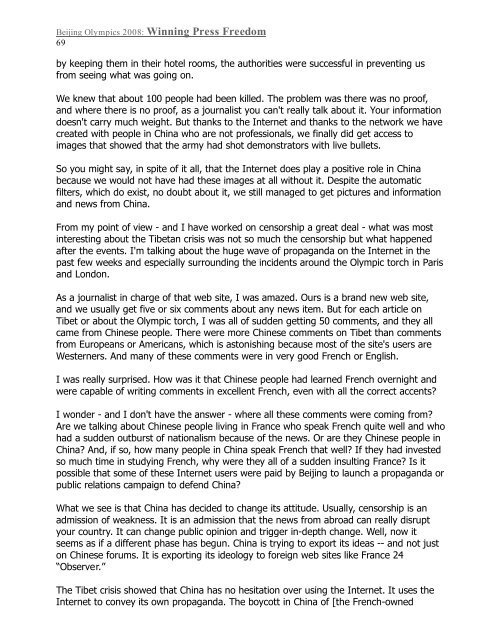Beijing Olympics 2008: Winning Press Freedom - World Press ...
Beijing Olympics 2008: Winning Press Freedom - World Press ...
Beijing Olympics 2008: Winning Press Freedom - World Press ...
Create successful ePaper yourself
Turn your PDF publications into a flip-book with our unique Google optimized e-Paper software.
<strong>Beijing</strong> <strong>Olympics</strong> <strong>2008</strong>: <strong>Winning</strong> <strong>Press</strong> <strong>Freedom</strong><br />
69<br />
by keeping them in their hotel rooms, the authorities were successful in preventing us<br />
from seeing what was going on.<br />
We knew that about 100 people had been killed. The problem was there was no proof,<br />
and where there is no proof, as a journalist you can't really talk about it. Your information<br />
doesn't carry much weight. But thanks to the Internet and thanks to the network we have<br />
created with people in China who are not professionals, we finally did get access to<br />
images that showed that the army had shot demonstrators with live bullets.<br />
So you might say, in spite of it all, that the Internet does play a positive role in China<br />
because we would not have had these images at all without it. Despite the automatic<br />
filters, which do exist, no doubt about it, we still managed to get pictures and information<br />
and news from China.<br />
From my point of view - and I have worked on censorship a great deal - what was most<br />
interesting about the Tibetan crisis was not so much the censorship but what happened<br />
after the events. I'm talking about the huge wave of propaganda on the Internet in the<br />
past few weeks and especially surrounding the incidents around the Olympic torch in Paris<br />
and London.<br />
As a journalist in charge of that web site, I was amazed. Ours is a brand new web site,<br />
and we usually get five or six comments about any news item. But for each article on<br />
Tibet or about the Olympic torch, I was all of sudden getting 50 comments, and they all<br />
came from Chinese people. There were more Chinese comments on Tibet than comments<br />
from Europeans or Americans, which is astonishing because most of the site's users are<br />
Westerners. And many of these comments were in very good French or English.<br />
I was really surprised. How was it that Chinese people had learned French overnight and<br />
were capable of writing comments in excellent French, even with all the correct accents?<br />
I wonder - and I don't have the answer - where all these comments were coming from?<br />
Are we talking about Chinese people living in France who speak French quite well and who<br />
had a sudden outburst of nationalism because of the news. Or are they Chinese people in<br />
China? And, if so, how many people in China speak French that well? If they had invested<br />
so much time in studying French, why were they all of a sudden insulting France? Is it<br />
possible that some of these Internet users were paid by <strong>Beijing</strong> to launch a propaganda or<br />
public relations campaign to defend China?<br />
What we see is that China has decided to change its attitude. Usually, censorship is an<br />
admission of weakness. It is an admission that the news from abroad can really disrupt<br />
your country. It can change public opinion and trigger in-depth change. Well, now it<br />
seems as if a different phase has begun. China is trying to export its ideas -- and not just<br />
on Chinese forums. It is exporting its ideology to foreign web sites like France 24<br />
“Observer.”<br />
The Tibet crisis showed that China has no hesitation over using the Internet. It uses the<br />
Internet to convey its own propaganda. The boycott in China of [the French-owned





